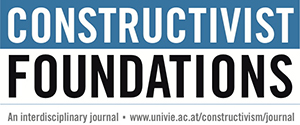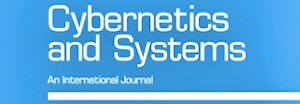Affiliated Publications
The American Society for Cybernetics maintains affiliations with publishers and academic journals in the area of cybernetics and systems, including the following:
Kybernetes
Kybernetes is the official journal of the UNESCO recognized, World Organisation of Systems and Cybernetics (WOSC) and The Cybernetics Society. The ASC has a long-standing relationship with Kybernetes, and several recent ASC conference proceedings have been published as dedicated Kybernetes double-issues. The journal is an important forum for the exchange of knowledge and information in cybernetics and systems thinking. The journal addresses major areas of concern and debate whilst highlighting future developments. The challenging and comprehensive nature of systems and cybernetics is reflected in the published articles which involve not only theoretical and methodological-oriented studies but also in-depth discussions of their related appliances and implementations. One of the primary objectives of the journal is to weed out pseudocybernetic claims and to base cybernetics on sound scientific foundations. The journal is concerned with the interdisciplinary study of cybernetics and systems in the widest sense.
Constructivist Foundations
Constructivist Foundations (CF) is an international peer-reviewed academic e-journal listed in the AHCI. It is dedicated to constructivist issues raised by philosophy as well as the natural, human, and applied sciences. The journal publishes original scholarly work in all areas of constructivist approaches, especially radical constructivism, enaction and enactive cognitive science, second order cybernetics, biology of cognition and the theory of autopoietic systems, non-dualizing philosophy, neurophenomenology and first-person research, among others. Numerous ASC members are actively engaged with this journal, as authors, reviewers, and as readers.
Cybernetics and Human Knowing
Cybernetics and Human Knowing is a quarterly international multi- and interdisciplinary journal on second order cybernetics, autopoiesis and cybersemiotics. The journal is devoted to the new understandings of self-organizing processes of information in human knowing that have arisen through the cybernetics of cybernetics, or second order cybernetics and its relation and relevance to other interdisciplinary approaches such as semiotics (cybersemiotics). This new development within cybernetics is a non disciplinary approach. Through the concept of self-reference it tries to explore: the meaning of cognition and communication; our understanding of organization and information in human, artificial and natural systems; and our understanding of understanding within the natural and social sciences, humanities, information and library science, and in social practices as design, education, organisation, teaching, therapy, art, management and politics. Cybernetics and Human Knowing has published ASC-related special issues, and it features regular columns on cybernetics, contributed by ASC members.
Cybernetics and Systems: An International Journal
Cybernetics and Systems: An International Journal is a peer-reviewed scientific journal of cybernetics and systems science, including artificial intelligence, computer science, cybernetics, human computer intelligence, information and communication technology, machine learning, and robotics. The journal was established in 1971 as Journal of Cybernetics and obtained its current title in 1980. It is published by Taylor & Francis in cooperation with the Austrian Society for Cybernetic Studies. Registered ASC members enjoy a discounted subscription rate for this journal.
Emergent Publications
Emergent Publications offers multi-disciplinary, cross-disciplinary complex systems papers and books, as well as the international journal Emergence: Complexity & Organization (E:CO), which is read by both academics and scholars worldwide. E:CO is published in association with Adelphi University, The Complexity Society and Cognitive Edge. A recent focus of Emergent Publications is on ‘applications of complexity’ in an effort to ground much of the abstract academic research in the real world.









